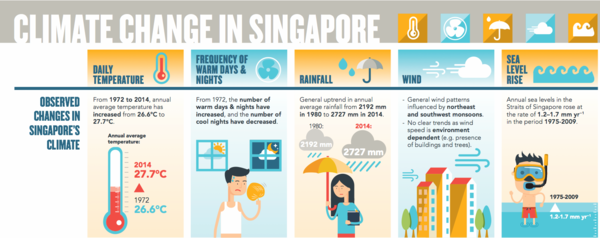Singapore’s just-released National Climate Change Study forecasts a rise in sea-level, higher temperatures and more extreme rainfall patterns - even if we cut emissions. Not good for the island state. By Jeremy Torr.
Singapore, April 2015 – Singapore’s Meteorological Service Centre for Climate Research Singapore (CCRS) has released its initial findings from its Second National Climate Change Study conducted over recent months. The results are not encouraging.
CCRS used two different computer models that simulate the most likely scenarios that would happen in Singapore. The first looked at what CCRS called a ‘business as usual' scenario where fossil fuels usage continued without significant change, leading to "very high greenhouse gas emissions" that build ever higher the 21st century. The second projected some action to control emissions, leading to a peak around 2050, then a decline.
HOTTER and HOTTER
In the first and more bleak scenario, temperatures would average from 2.9° to 4.6°C higher over the next 50-80 years. As for rainfall, it would become more extreme. Thecontrast between wetter and drier months will grow, and seasonal rainfall will increase during the November - January wet season, but will be accompanied by much drier conditions from (February and June - September), up to a 30% decrease in rainfall.

And for sea levels, the study projected a staggering 0.45m to 1.02m rise by the year 2100 if no changes in emissions are achieved. Even under the best scenario Singapore faces a mean sea level rise of 0.25m to 0.60m between 2070 and 2099. With some recent UN-sanctioned studies projecting the displacement of several million people from southeast Asia's coastal zones (of which Singapore is a complete example) in the event of a 1-m rise in sea level, the future could be potentially disastrous for many Singaporeans.
But it not just flooding and erratic rain that will bother us in coming decades. According to Chris Gordon, director of the CCRS, higher temperatures will lead to increases in the incidence of heat stress, which is uncomfortable at the best of times but can be fatal for old people or babies.
“This discomfort that people experience in hot and humid weather is [even more] important for people working outdoors,” said Gordon.
HAPPENING NOW
The historical norm in Singapore is for some 25 days a year when temperatures go above 34°C. Even in the best case scenario, with reduced emissions, we could see anything between 74 and 108 days at that extreme temperature. That's a possible four-fold increase.

"Not many people would doubt that some part of the temperature change we have seen [already] for Singapore is due to climate change," said Gordon, although he noted that changing rainfall patterns could be due to other issues.
The study, commissioned by the National Environment Agency (NEA) and the UK'sMet Office, should be completed by the end of the year to give yet more data on our upcoming climate.
According to the UN's International Fund for Agricultural Development (IFAD), the results of climate change on southeast Asia as a whole would be severe, with "climate extremes, particularly floods, droughts and tropical cyclones, [with] large areas of the region highly prone to flooding and monsoons."
IFAD has pointed out secondary effects from the changes in temperature, sea-level and precipitation that include coastal erosion and land loss, inundation and sea flooding, upstream movement of the saline or freshwater front, and seawater intrusion into freshwater (drinking source) areas.
The writing is already on the wall, without doubt. As well as the projections of the report, the facts bear out significant changes in the weather already. February last year was the driest month for Singapore in 145 years, with Australian-style parched lawns and wilting, leafless trees. And although the forecasters say that kind of "big dry" is not likely to happen every year, they do admit that it is likely to become much more frequent.
Turn down the air-con and get out the bicycle before we all sink under the waves.
- For more information about the CCRS report,go to : http://www.nea.gov.sg/corporate-functions/newsroom/news-releases/second-national-climate-change-study-findings-released
- For more about the IFAD report, go to : http://www.ifad.org/events/apr09/impact/se_asia.pdf